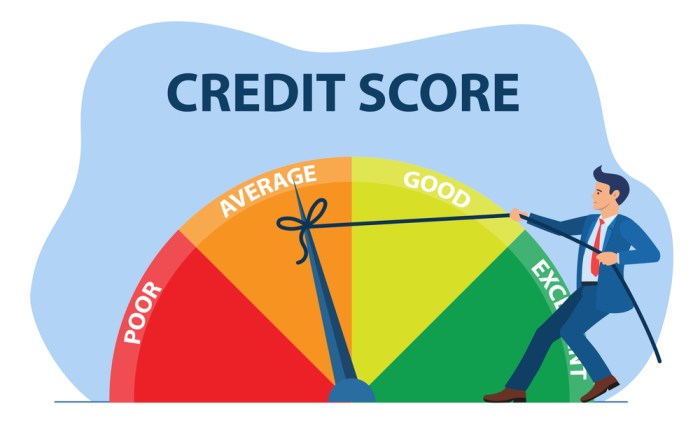Starting off with Credit score improvement, this intro is here to grab your attention and give you a taste of what’s to come. It’s all about leveling up your financial game and making those numbers work for you.
Importance of Credit Score Improvement
Having a good credit score is crucial for financial health as it impacts various aspects of an individual’s financial life. From getting approved for loans to securing lower interest rates, a higher credit score can open up a world of opportunities.
Benefits of a Higher Credit Score
- Qualifying for better loan options, such as mortgages or car loans
- Access to higher credit limits and lower interest rates on credit cards
- Potential for lower insurance premiums
- Increased chances of approval for rental applications
Impact of a Poor Credit Score
- Difficulty in getting approved for loans or credit cards
- Higher interest rates on loans, leading to more expensive borrowing costs
- Limited access to financial opportunities and products
- Negative impact on employment opportunities, as some employers may check credit scores
Understanding Credit Scores

A credit score is a three-digit number that represents a person’s creditworthiness. It is used by lenders to determine the likelihood of a borrower repaying their debts on time. Credit scores are calculated based on information from credit reports.
Factors Influencing Credit Scores
Several factors influence a person’s credit score:
- Payment History: This is the most significant factor and reflects whether payments are made on time.
- Amounts Owed: This considers the total amount of debt a person owes.
- Length of Credit History: The longer the credit history, the better for the credit score.
- New Credit: Opening multiple new credit accounts in a short period can negatively impact the score.
- Credit Mix: Having a mix of different types of credit accounts can positively impact the score.
Range of Credit Scores
Credit scores typically range from 300 to 850, with higher scores indicating better creditworthiness. The ranges are usually categorized as follows:
- 300-579: Poor – Individuals with scores in this range may have difficulty obtaining credit.
- 580-669: Fair – Borrowers may qualify for credit, but with higher interest rates.
- 670-739: Good – This range is considered to be a solid credit score.
- 740-799: Very Good – Borrowers in this range will likely receive better interest rates.
- 800-850: Excellent – The highest credit score range, with borrowers having the best chances of loan approval at the lowest interest rates.
Strategies for Improving Credit Scores
Improving your credit score is crucial for financial health and securing better opportunities. By implementing certain strategies, individuals can boost their credit scores and enhance their overall financial well-being.
Timely Payments
One of the most effective ways to improve your credit score is by making timely payments on all your credit accounts. Payment history plays a significant role in determining your credit score, so ensuring that all bills are paid on time is essential.
Lowering Credit Utilization
Another strategy to boost your credit score is by lowering your credit utilization ratio. This ratio represents the amount of credit you are using compared to the total credit available to you. Keeping this ratio low, ideally below 30%, can positively impact your credit score.
Disputing Errors
If you come across any errors or inaccuracies on your credit report, disputing them can help improve your credit score. It’s important to regularly review your credit report and address any discrepancies promptly to ensure that your credit score is an accurate reflection of your creditworthiness.
Monitoring Credit Reports Regularly
Regularly monitoring your credit reports is crucial for maintaining a healthy credit score. By keeping an eye on your credit reports, you can quickly identify any issues or discrepancies and take the necessary steps to address them. This proactive approach can help prevent potential damage to your credit score.
Effects of Credit Score Improvement
Improving your credit score can have a significant impact on your financial well-being. Let’s explore how a better credit score can open up new opportunities for you.
Better Interest Rates on Loans
- With an improved credit score, you are more likely to qualify for lower interest rates on loans, such as mortgages, auto loans, and personal loans.
- Lenders view borrowers with higher credit scores as less risky, which translates to better terms and lower interest rates.
- For example, someone with a credit score of 750 may qualify for a mortgage with a 3% interest rate, while someone with a score of 600 might be offered a rate of 5% for the same loan amount.
Increased Approval Odds for Credit Applications
- Having a higher credit score improves your chances of getting approved for credit cards, loans, and other financial products.
- Lenders are more likely to trust you with credit if you have a good track record of managing debt and making payments on time.
- For instance, a credit card application that may have been denied with a low credit score could be approved with a higher score, giving you access to credit when you need it.
More Financial Opportunities
- As your credit score improves, you may qualify for higher credit limits on your existing credit cards, allowing you to make larger purchases or handle unexpected expenses.
- Additionally, a better credit score can make it easier to secure rental housing, as landlords often check credit scores as part of the application process.
- Overall, improving your credit score can lead to a brighter financial future with more options and flexibility in managing your money.
